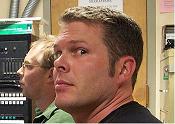 Bridgeman's devotion to that ancient religion screams out for documentation, and that's where I come in. Well done, I say. Well done. Now, where is your BLOG, young Jedi? However profoundly affected you may be by this display of wizardry, I don't want to take too much attention away from the post below this one, especially regarding the Tindall review.
Bridgeman's devotion to that ancient religion screams out for documentation, and that's where I come in. Well done, I say. Well done. Now, where is your BLOG, young Jedi? However profoundly affected you may be by this display of wizardry, I don't want to take too much attention away from the post below this one, especially regarding the Tindall review.I will take this moment to say that I'm thrilled for her and her new career as a writer, because anyone who hates the music profession as much as she does/did (showing up drunk and/or high for Broadway gigs, professional gaffes too numerous to mention) needs to do something else, so that her positions may be filled with musicians who live to perform and accord the proper respect to the art form. And as for my favorite part of the book: anyone who subs for the New York Philharmonic for ten years should know how to play Pictures at an Exhibition. There is absolutely no excuse for playing wrong notes in an audition--not to mention the same mistake three times in a row. I know the 80s were integrally wed to the cocaine craze, but they did have scores and recordings back then. Any instrumentalist taking an audition without complete knowledge of the repertoire is demonstrating a real lack of intelligence--borderline stupidity, really. Maybe her former colleague (now Principal Oboe with the Houston Symphony Orchestra) was right (see the link in the post below). At any rate, there is a lot to learn about the business in this book--most of it would fall under "How to Ruin a Career in Classical Music," which is why I have added it to the required texts of my Literature and Pedagogy Seminar. Enjoy!
